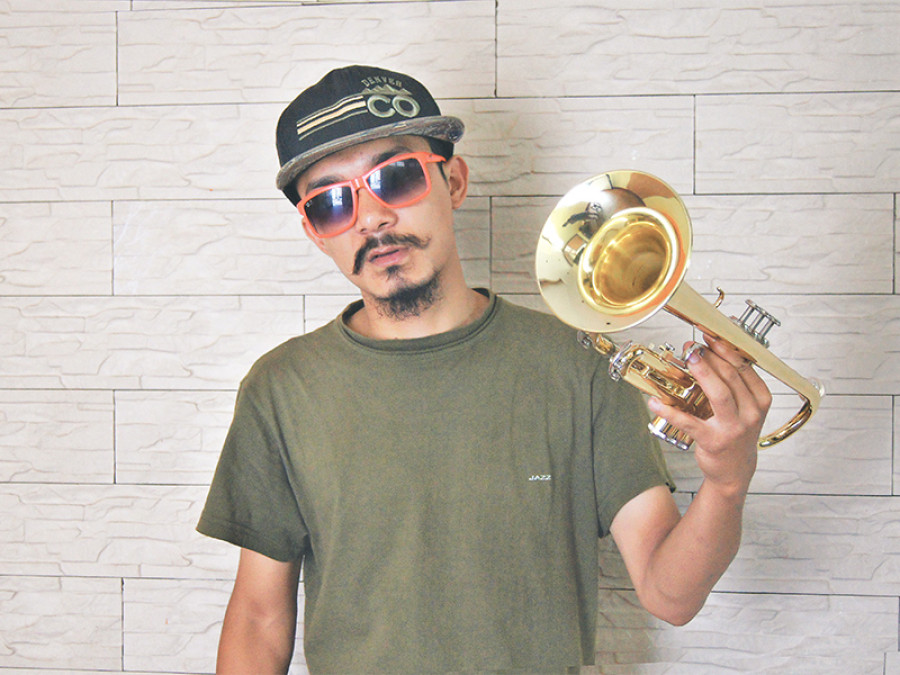Entertainment
Whacko about jazz: Jackowacko
Musician Subash Jung, popularly known as Jackowacko, is a multi-instrumentalist jazz musicianon the rise
Amir Maharjan
On August 28, Adrian Pradhan released a new album titled Abhiwaadan. On the back cover, the songs Chopstick and Jaatley Paako were credited to an unusual name: Jackowacko. Subash Jung Pandey, popularly known as Jackowacko among his friends, is a jazz bassist, trumpeter and composer.
Jackowacko was always fond of listening to music on the radio or on the television, but his true passion for music grew when he started taking classical lessons on playing a recorder from Yoshihiro Akita, a classical pianist and a recorder player. From a very young age, he was exposed to sophisticated music such as classical and jazz. “I started listening to Miles Davis and Louis Armstrong when I was 15. I had already decided then that I would be a jazz musician,” he says. After taking some courses with Akita, he took a little break from the recorder and started composing at the age of 17. His interest in jazz grew when he started listening to Jaco Pastorius, a jazz bassist and composer. He started taking bass guitar courses and learnt techniques like walking bass and counterpoint, which was enough for him to learn and experiment by himself.
At the age of 19, he bought his first bass guitar and was asked to play for a jazz band called Inner Groove that, according to Jacko, brought maturity into his jazz playing style. For someone with a predominantly classical background, Jacko easily fit into the band’s playing style as he had learnt sight reading at a very young age. Although he had enrolled in an engineering college, he performed weekly gigs at the Hyatt Hotel with his band—the start of his music career. After he realized that he could survive financially with his earnings from the band, he decided to drop out of engineering college. He played with the band for another four years as their bassist until the band formally separated.
By the time the band had separated, Jacko had formed a network with professional musicians such as the Australian jazz bassist Marcus Dengate, with whom he learned much more about music. The two became close friends, but with an almost teacher-student relationship. Jacko would always learn about jazz and bass techniques from Marcus over coffee.
On December 2012, he won the Brass Scholarship at the Kathmandu Jazz Conservatory (KJC), where he started taking trumpet classes. “After 4 classes, no one attended the class but me. The classes were cancelled, but that didn’t stop me from wanting to learn more. So, I went back to researching and taught myself.” During this time, Jacko constantly visited the KJC for resources on trumpeting. When Nirakar Yakthumba—founding member and bassist of 1974 AD—saw this, he asked Jacko to play for What the Funk, a band that regularly performed at Moksh, Jhamsikhel. Jacko was unsure about the offer as he had only touched a trumpet 5 months ago—and he didn’t even own one. But Nirakar, recognising his potential, bought a trumpet for him. Jacko, moved by Nirakar’s actions, practiced day and night, and soon became an official member of the band.
Although very familiar with the trumpet, Jacko wasn’t perfect yet. Along with some friends, he formed two bands—Herbal People, that played contemporary hard-core jazz music, and Mad Jazz Quartet, that played mainstream jazz music. As a member of these bands, he was exposed to different styles of playing jazz on the trumpet. At the same time, he also became an official member of the new 1974 AD with whom he travelled to the States. His main focus was to improve his trumpet-playing skills, as he had started traveling and performing for bands such as What the Funk and 1974 AD. “With a bass, I can only improvise with rhythm and harmony; but with a trumpet, I could now improvise with melody, harmony, tone and sometimes rhythm, too-this, I think, is important—to be able to improvise as a jazz musician,” he said.
Jacko isn’t just about covering and re-interpreting jazz music. Ever since he took courses with Yoshihiro Akita, he has been composing his own songs. He played some of his compositions to his friend Anisha Maharjan, a singer herself, and soon they turned his raw compositions into fully developed songs. One of his songs, Swarthi, won the Songs Nepal contest in 2013. “Anisha was one of the first people to go through my compositions and she has always been very supportive,” Jacko said. His composition career started when Anisha returned from the States and they started producing music together. Now, Jacko has started sharing his compositions with the bands he is involved with—What the Funk and 1974 AD.
Apart from in Adrian Pradhan’s album, Jacko’s compositions can be found in Rohit John Chettri’s to-be-released album: Jacko has composed Sannani, Yo Kalo Sanjh, and Jani Jani—tracks for the album. One of his compositions in Adrian’s album, Jaatley paako, is heavily jazz-influenced, with 2-5-1 jazz progressions, while it incorporates Nepali folk musical elements. “Nepali musicians haven’t become familiarised with jazz yet. My focus now is to make jazz commercially successful in Nepal,” Jacko says.




 13.12°C Kathmandu
13.12°C Kathmandu










